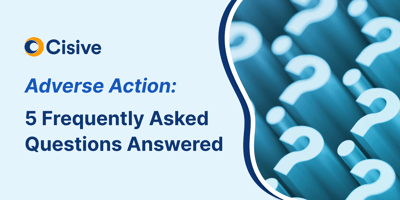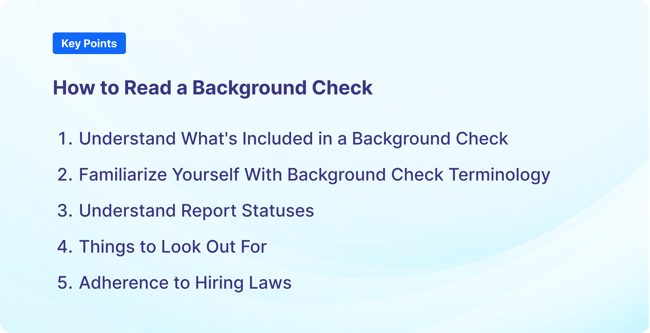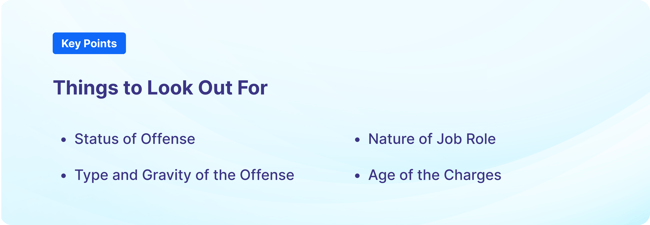

Understanding how the adverse action process works is crucial to staying on the right side of the...

Comprehensive background checks can alert employers to potential issues with prospective candidates. This can prevent employers from making bad hiring decisions that could jeopardize the company’s reputation, culture, and standards.
For instance, finding out that a candidate has a violent criminal history can prevent the employer from making a hiring decision that could put other workers at risk.
However, conducting these checks is just the first step. It’s also important to know how to read a background check right.
This guide for employers can shed light on various topics, including the following:
Conducting background checks on potential candidates is an essential part of an effective recruitment process. While these checks can provide relevant information, it’s important to fully understand how to read a background check accurately so you can make the right hiring decisions.
This guide provides employers with the tools they need to properly read criminal background checks.
Key TakeawaysHere’s what you need to do to read a background check efficiently.
|
As an employer, the last thing you want to do is spend company time and resources to recruit a new hire just to find out weeks later that they’re a bad fit. Unfortunately, this is a costly mistake that many employers of all industries make.
Conducting background checks can reduce the risk of hiring an employee that doesn’t match company values or standards. For instance, this type of check can prevent you from hiring a candidate who could put the company at risk for theft, fraud, or embezzlement.
This type of pre-employment check can also prevent the creation of a toxic, unsafe work environment. For example, a background check can alert you to a potential candidate’s violent criminal background.
For some industries, such as healthcare, background checks may be a mandatory part of the hiring process. Conducting a comprehensive check can keep your company compliant with industry requirements.
Recommended Reading: What’s the Real Cost of a Bad Hire?

Conducting criminal background checks for prospective candidates is just the first step. It’s equally important to accurately examine and read the results.
Below are several tips to help you effectively read a background check.
The type of information included in a background check depends on the set criteria you request. Depending on your industry, the specific job role, and company standards, a background check could include search results from multiple types of databases, including:
A clear background check reveals no criminal charges of any type. These reports require no further evaluation.
However, if a search of these databases reveals one or more criminal charges, each one will be listed separately on the report. In addition to the name of the offense, criminal background reports also note the degree of the crime.
There are different levels of offenses that show on criminal background reports, including:
In addition to the type of offense, criminal background checks also include dispositions. This designates the final outcome of the case.
Criminal cases can have a variety of outcomes.
Information on background checks is usually broken down into several sections.
One section provides information about the offender, such as their name, date of birth, and any aliases. It’s important to double-check this information to make sure it corresponds with your prospective candidate’s details.
The report also displays information about the origins of the details, such as the county and court the case was held in, as well as the case number. Finally, the report will provide details of the case, including the specific charges, level of offense, disposition, and sentencing, if applicable.
Oftentimes, these reports may include abbreviations for some commonly used words in the court system. If you don’t have experience with the courts, it can be difficult to decipher some of the abbreviations.
To help with this process, below is a list of some of the most commonly used abbreviations in criminal background reports.
Recommended Reading: 4C of Onboarding
As an employer, you can track the status of each criminal background check as it works through the Cisive tracking process.

Once you receive a criminal background check report for a potential candidate, it’s important to examine the results carefully. If the report is clear and there’s no criminal record for the candidate, you can obviously move on to the next stage of the hiring process.
If, on the other hand, the criminal records show one or more potential crimes, a closer review is needed. Here’s a look at some factors you should consider when making this decision.
It’s important to check the status of the charges. For example, if the charges were dismissed or the charges never led to an arrest, it means the candidate was never found guilty, or there was not enough evidence to proceed.
On the other hand, if there’s already been a conviction, the candidate was found guilty or pled guilty to the crime. These cases require a closer look.
Any criminal record can be alarming to employers. However, it’s vital to evaluate the type and gravity of the crime.
There’s a big difference between a Class A felony and a Class C misdemeanor. For instance, a felony could be a serious crime, such as murder or aggravated assault, while a misdemeanor could be a bad check or trespassing charge.
While the severity of the offense is an important factor to consider, it’s also vital to weigh this offense against the job role and duties.
For example, a bad check charge may not be very significant in the manufacturing industry, but if you’re hiring someone to work in your financial department, it could make a difference.
Carefully examine the various duties of the job role and compare that to the type of offense to determine if the candidate’s criminal record could impact their job performance or put the company at risk.
Finally, be sure to consider the amount of time that has elapsed since the conviction. Charges that occurred 20 years ago may no longer be relevant, especially if they have no new charges. A candidate with recent charges may be more concerning.
You may be tempted to decline any candidate who has a criminal record. However, this blanket policy may put you out of compliance with state or federal regulations.
Unless the role in question requires candidates to have relatively clean criminal records, such as in health care, it’s important to carefully review these background checks before making any hiring decisions.
If, after reading a background check, you still decide not to hire the candidate, it’s important to follow all regulations set by the Fair Credit Reporting Act. This includes sending pre-adverse action letters and giving the candidate time to respond before sending a final adverse action notification.
Recommended Reading: Best Background Check for Employers
Between legal terminology and different offenses, knowing how to read a background check can be confusing. You can avoid some of this confusion by working with a professional background check provider, such as Cisive.
Our specialists at Cisive can work directly with you to set parameters for your background check process that best meet your needs and comply with legal requirements.
Best of all, our experts are always available to help answer any questions you may have and help you better understand how to read a background report.
Speak with a Cisive expert to learn more.
Author: Cisive Staff
Bio: Contributed by a member of our staff with expertise in background screening for highly regulated industries.
Let's Connect on LinkedIn
Understanding how the adverse action process works is crucial to staying on the right side of the...

Employers rely on background checks to maintain a safe and productive work environment. As you vet...

Healthcare employers have unique needs when it comes to vetting potential employees. Whether you're...